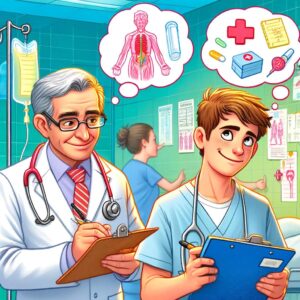
With each passing year, more and more doctors enter medical school after first scribing. Working as a scribe is a great way to gain clinical experience, sometimes while candidates are also taking classes to fill out their prerequisites. Medical scribing is a valuable experience for aspiring healthcare professionals, as it provides insight into the daily workings of a medical practice.
As more and more of our clients come to us from scribing backgrounds, we at Gurufi / FourthWrite created our ScribeToMD program, which seeks to provide scribes with free resources to help them with this process. To that end, here are ten tips for getting the most out of your medical scribing experience:
- Take detailed notes: As a scribe, you will have the opportunity to observe medical procedures, diagnoses, and treatments. Take detailed notes on what you see and hear, as this will help you gain a deeper understanding of the healthcare process. To help you do this, we created our downloadable Scribe Journal. Use it as a journal. Our clients who used the Beta version raved at how it helped them organize their thoughts, recall specific events, and note their growth when it came time to apply for medical school.
- Ask questions: Don’t be afraid to ask questions of the healthcare provider you are scribing for. This will help you gain a better understanding of the patient’s condition, the reasoning behind specific treatments, and the overall healthcare process. Doctors are typically quite receptive to explaining things and replying to questions. Use their insights -and perhaps even mentorship- to help guide you.
- Be attentive: Pay close attention to the interactions between the healthcare provider and the patient, as well as between the healthcare provider and other members of the healthcare team. This will help you understand the importance of good communication and teamwork in healthcare.
- Observe medical procedures: Take advantage of the opportunity to observe medical procedures, such as surgeries or physical exams. This will give you a hands-on understanding of what it is like to be a healthcare provider.
- Reflect on your experiences: After each scribing session, take some time to reflect on what you have learned. Think about how your experiences can help inform your future career goals and how you can apply what you have learned to your future studies.
- Network: Take advantage of the opportunity to network with healthcare providers and other members of the healthcare team. Ask for their advice and perspectives on the healthcare field, and discuss your own career goals with them.
- Shadow different healthcare providers: If possible, try to shadow different types of healthcare providers, such as physicians, nurses, and physician assistants. This will give you a well-rounded understanding of the different roles and responsibilities in healthcare.
- Seek feedback: Ask for feedback from the healthcare provider you are scribing for. This will help you understand what you are doing well and what you can improve upon.
- Volunteer: If possible, volunteer at a clinic or hospital to gain additional exposure to the healthcare field. This will help you build your network, gain hands-on experience, and better understand the challenges faced by healthcare providers. Moreover, having a broad and diverse perspective will both help you chart your course forward and be a credit to you in the application process.
- Pursue additional education: Take advantage of any opportunities to pursue additional education, such as courses or workshops, that will help you build your knowledge and skills. This will help you be a more informed and effective healthcare provider in the future.
Medical scribing is a valuable experience for aspiring healthcare professionals. By following these ten tips, you can get the most out of your medical scribing experience and gain a deeper understanding of the healthcare field. In the meantime, check out our Scribe to MD Facebook page.
For more help with your personal statement, check us out at Gurufi.com. Our personal statement editors and consultants have decades of experience helping clients get into top Masters and Ph.D. programs in STEM, humanities, fine arts, and social sciences. Our specialty is helping you craft compelling personal statements that move the needle in your admissions process! For questions, shoot us an email at service@gurufi.com. Check us out on Facebook, Twitter, and LinkedIn.
